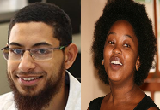Blog
Unless otherwise stated, content is shared under CC-BY-NC Licence
Breaking Down Barriers as part of our DNA
Antonio Guillermo Martinez is the CEO and founder of LIBNOVA.
Este blog está disponible en español a continuación:
Last year, in our guest post on the DPC blog we wrote about the challenges of the digital preservation of research datasets, and unknowingly it was slightly related to this year's chosen topic: Breaking Down Barriers.
This year, we want to focus on some of the technological barriers that LIBNOVA has broken down to make digital preservation more accessible to the community by simplifying it.
Historically, digital preservation systems have been complex to use and complex to set up. When we first met this community, everything was complicated, everything was difficult to do. LIBNOVA has focused every single day since its inception on breaking down those barriers, empowering the community to do more with less, and optimizing its systems to help them achieve that.
UCT Libraries on the road to digital preservation
Ya’qub Ebrahim and Thandokazi Maceba are both Data Curation Officers at University of Cape Town Libraries, Digital Library Services.
For a number of years now we have planned and strategised and now it’s time to implement. Implement what you ask? Well, it all started in 2015 when UCT libraries had the vision of creating two Data Curator positions in the Digital Library Services department. Fast forward to 2018 and we have successfully scoped and motivated for implementing a digital preservation system. Finally in 2021, this system, which we have named Izolo (isiXhosa for ‘Yesterday’) is installed and set to store not only historic, or ‘special,’ collections at the University, but all data requiring preservation at UCT[1]. But, policies aside, as the data curators and preservation experts we see our job as being to ensure that data gets preserved, period.
Digitisation and Digital Preservation journey at Unisa Library and Information Services
Ansie van der Westhuizen is Non-commercial Digital Developer (Institutional Repository) and Anri van der Westhuizen is Manager of Archives. They both work at the University of South Africa (Unisa).
The Unisa Institutional Repository (UnisaIR) was launched in May 2009. Challenges and barriers were the order of the day. During a conference in Senegal, Nkosi (2008) rightfully called these barriers by name: mistrust, resistance and lack of skills. At present the UnisaIR is still operating as a “traditional institutional repository”. However, it became and remains a flagship service offered by the Unisa Library and Information Services and is continuously breaking down barriers.
Encountering barriers along the way – Why networks are a part of the solution
Svenia Pohlkamp Runs the nestor office at the German National Library
When asked to write a blogpost to be published on this year’s WDPD I started thinking about the motto “Breaking down barriers”, digital preservation and my work at nestor. In the end I had a disturbingly long list of barriers in my mind, that I needed to order and bring into perspective. This text is the result (though it does not deal with every barrier I could think of) and it tries three things at once: Relating my experiences of working in a network while people are advised not to meet, looking into barriers that are relevant to our work in digipres and letting you know what nestor is all about.
Should Digital Preservation be Perfect?
Irina Schmid is Digital Collections Archivist for American University in Cairo

https://thesaurus.plus/synonyms/model_of
World Digital Preservation Day is a special day for us to celebrate. Digital preservation is not an easy program to start. Various technologies, a large number of files, not enough financial support, and sometimes just not knowing where to begin. Or it could be a desire for perfection that can halt an idea, without realizing that only imperfections and difficulties can initiate a preservation program. Adding coal to a firebox can start an engine, and at the American University in Cairo (AUC), we are using the same technique. Our small but solid steps act like coal igniting the preservation engine, which leads us to the destination.
Series: an underestimated but valuable concept
Koen Dobbelaere & Quincy Oeyen work at Digital Archives Flanders for the Agency for Facility Operations of the Flemish Government
The expanding digitization of the government brings new challenges regarding the management, the (long term) preservation and the disclosure of digitally created or digitally received information. To tackle these challenges in an efficient way Digital Archives Flanders uses the concept of ‘series’. We define a series as: “An aggregation of files created and maintained by an owner, in the same identifiable sequence, or the result from the same accumulation or filing process, and of similar function, format or informational content”.
Breaking Down Preservation Barriers, One Small Step at a Time
Elizabeth Kata is Archives Associate for the International Atomic Energy Agency based in Austria
Let’s face it, there are a lot of barriers to preservation, often due to a lack of resources. An institution needs enough staff and sufficient training opportunities for said staff, technical infrastructure, and an institutional commitment to finance preservation measures. When we began examining our digital holdings in 2020, we encountered a variety of barriers, both anticipated and unexpected.
Digital preservation reading club?
Barbara Sierman is a Digital Preservation Consultant
Is digital preservation a profession? And if so, what characterizes it as a profession? If you look at a skilled carpenter, the professionalism is defined by the skills of the carpenter, the tools that are used, the flexibility to apply centuries old knowledge in different situations and materials and above all, to expand this knowledge.
BREAKING DOWN BARRIERS with CSC Climate negative / zero Carbon data center
Veli-Antti Leinonen is a Specialist at the Kajaani Data Center Program, CSC IT Center for Science in Finland
In order to secure the digital preservation in long term, the preservation MUST be ecologically on a solid foundation. Otherwise, the data can’t be preserved in the future if it consumes too much of earth’s resources. Non-sustainable preservation will eventually lead into data loss or intentional deletion of data. This is comparable to subject that organizations need to be on a sound foundation to assure the reliability, but from the environmental point of view. In addition to our data center operations, CSC provides national digital preservation services for both cultural heritage sector and research data in Finland, and acts as a national competence center for digital preservation. Having energy efficient data centers provides ecologically sustainable solutions especially when considering bit-level digital preservation.
Curating Repatriated Content for Long-term Digital Preservation
Dr Arif Shaon is Senior Digital Curation Specialist at the Qatar National Library.
Efficient long-term digital preservation requires a series of operations to be undertaken throughout the lifecycle of a digital object. The task of preparing content for preservation – i.e., a Submission Information Package (SIP)[1] is a crucial step in the overall workflow as this is where the semantic and structural quality of both data and metadata is set for accessing and using the content in the future. The lower the quality of a SIP, the lower the longevity of the content being preserved.
For large collections of digital objects acquired from external institutions, the task of preparing SIPs can be very challenging. This is especially true where the policies for data and metadata quality of the acquiring organization cannot be easily aligned with those of the donor or contributing organizations.


























































































































































